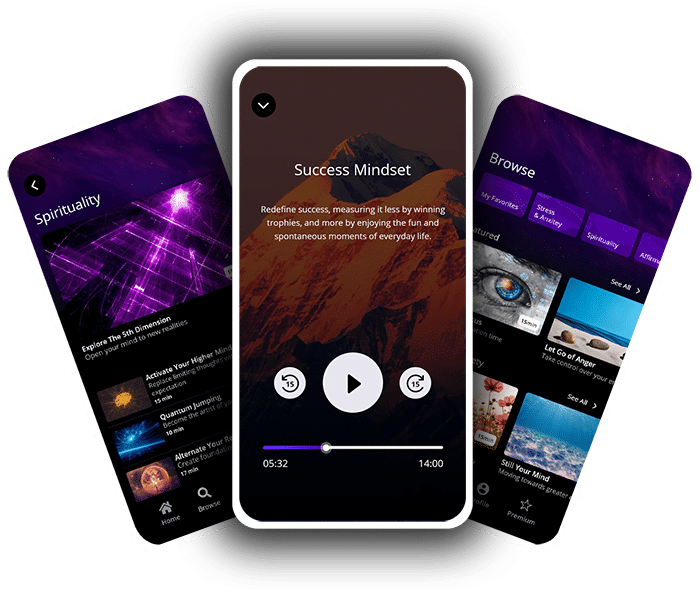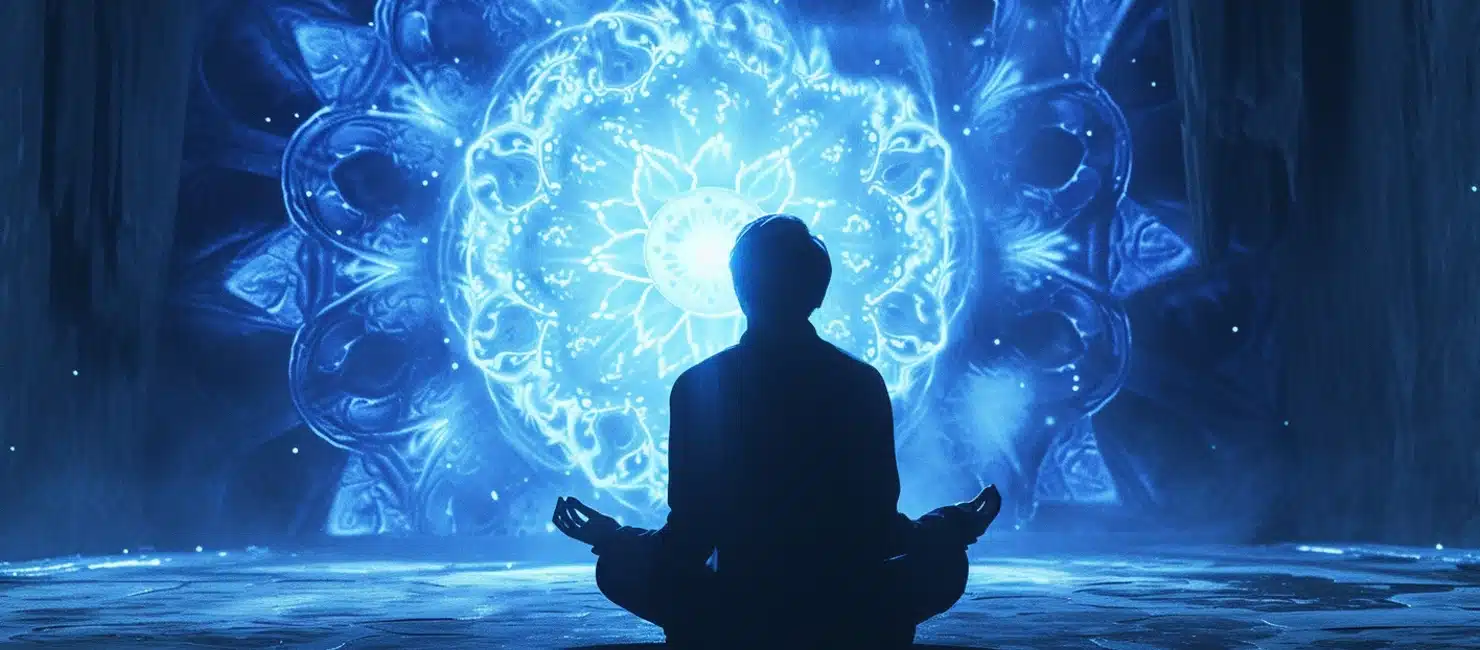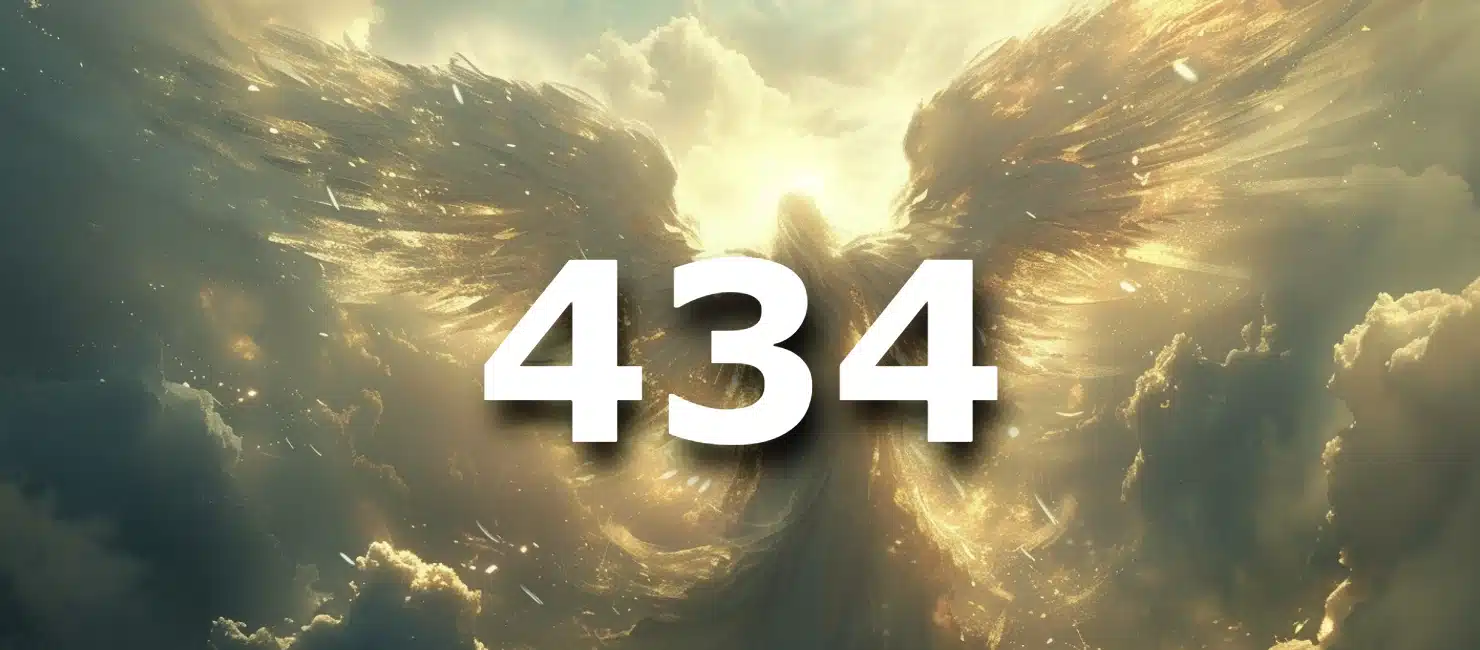Life can often leave our minds feeling overwhelmed, cluttered, and weighed down by negative thoughts or unnecessary mental baggage. Finding a way to declutter your mind is crucial for improving your mental health and overall well-being.
This is where meditation steps in as a powerful tool that helps clear your mind of the mental clutter and sharpen your focus on what truly matters. In this blog post, we’ll explore various meditation techniques explicitly designed for clearing the mind, along with additional strategies to maintain a healthy mental space.
Get ready to relax and discover how embracing regular meditation practice can transform not only your thought process but also enhance various aspects of your daily life.
You can start with this interesting guided meditation!

Unleash Your True Potential!
Explore the world of meditation with our powerful guided sessions crafted to bring peace and strength to your spirit.
But first, let’s ensure our sessions are the perfect fit for you.
Take our short quiz to find out!
Table of contents
- Key Takeaways
- Understanding The Impacts Of Mental Clutter On Your Mind
- Simple Meditation For Clearing Mind
- Additional Techniques For Clearing Mental Clutter
- The Benefits Of Regular Meditation Practice On Mental Clarity
- Tips For Practicing Meditation As A Habit
- Overcoming Common Challenges In Your Meditation Practice
- Conclusion:
Key Takeaways
- Meditation is a powerful tool for clearing mental clutter, reducing stress and anxiety, and improving overall well-being.
- Simple techniques like mindful breathing, body scan meditation, visualization meditation, and walking meditation help to cultivate a strong connection between the mind and body while promoting mindfulness and clarity.
- Other strategies like journaling or decluttering physical space can also be effective in reducing mental clutter, while practicing gratitude can increase happiness levels. Regular practice of these techniques leads to improved emotional well-being along with better decision-making skills and increased creativity and focus.
Understanding The Impacts Of Mental Clutter On Your Mind
Mental clutter can manifest in various ways, such as intrusive thoughts, difficulty focusing, and negative emotions. These manifestations can significantly impact our daily lives by obstructing our ability to think clearly. It can also impact the ability to make informed decisions and maintain emotional well-being.
The mind is not habitual of holding onto an excess of information or processing everything at the same time. A lot like computers with limited memory and processing capacity. As a result, when we allow mental clutter to accumulate unchecked, it hinders the brain’s ability to function optimally.
For instance, continually dwelling on negative thoughts may lead us down the path of anxiety or depression.

In today’s fast-paced world, where multitasking has become all too common. Clearing your mind is vital for overall health and wellness. One effective way to combat these issues is through practicing meditation consistently (important fact #5).
By engaging in mindfulness meditation practices regularly (such as guided meditations), we can learn how to manage stress effectively. They also incredibly help with reducing negative thoughts that contribute towards overwhelming feelings.
Simple Meditation For Clearing Mind
Learn how to let go of intrusive thoughts and declutter your mind with simple meditation techniques.
Mindful Breathing
Mindful breathing is a fundamental aspect of meditation for clearing the mind and boosting overall mental clarity. This simple yet powerful technique requires you to focus on your breath as you inhale and exhale, allowing thoughts and feelings to come and go without judgment or analysis.
Incorporating mindful breathing into daily life can lead to lasting improvements in well-being and emotional resilience. As an added bonus, practicing this type of meditation becomes increasingly easier over time as your ability to stay focused sharpens.
For example, simply taking a deep breath during moments of heightened anxiety can help alleviate those negative emotions by redirecting the mind’s focus back onto calming sensations instead.

Unleash Your True Potential!
Explore the world of meditation with our powerful guided sessions crafted to bring peace and strength to your spirit.
But first, let’s ensure our sessions are the perfect fit for you.
Take our short quiz to find out!
Body Scan Meditation
Body Scan Meditation is an effective practice for clearing mental clutter by cultivating a strong connection between the mind and the body. This technique involves directing your attention to different parts of your body, starting from the toes and moving upwards, while observing sensations without judgment.
For instance, imagine lying down in a comfortable position with your eyes closed as you slow down your breaths. Begin to mentally scan through each part of your body – noticing any areas of discomfort or tension along the way.
As you identify these points, take a few deep breaths while focusing on releasing that feeling of tightness with every exhale. This simple practice not only increases mindfulness but also enhances self-awareness. Mindfulness and self-awareness are two key components in maintaining mental clarity amid life’s challenges.
Visualization Meditation
Another effective technique for clearing mental clutter is visualization meditation. This form of meditation involves visualizing a calming image or scenario, such as a peaceful beach or a forest.
By focusing on this imagery, you can quiet your mind and reduce the impact of intrusive thoughts.
There are plenty of ways to practice visualization meditation. Some people prefer to use guided meditations that walk them through the process. Some may simply create their own imagery in their minds during their meditation sessions.
Related: 4 Must Try Vivid Visualization Tips – How To Visualize In Meditation
Walking Meditation

Walking meditation is a very simple and effective way to clear mental clutter while getting some fresh air and physical exercise. This meditation practice involves paying attention to each step you take, focusing on the sensation of your feet touching the ground and the movement of your body as you walk.
As you move forward with intention, negative thoughts and stress slowly dissipate, leaving you feeling calm and centered. Walking meditation can also be combined with mindfulness by taking in your surroundings, and noticing colors, sounds or smells around you. This makes it an excellent tool for finding clarity in difficult situations.
Additional Techniques For Clearing Mental Clutter
In addition to meditation, there are other techniques to clear mental clutter, including journaling to decrease intrusive thoughts. You can also benefit from decluttering physical space to mentally prepare for other activities.
Journaling
Journaling is another technique that can help reduce mental clutter and promote clearer thinking. The practice involves writing down thoughts, emotions, and experiences in a journal or notebook regularly.
By putting your thoughts on paper, it can help you process and work through any overwhelming feelings or ideas.
Research has shown the positive effects of journaling on reducing stress and anxiety. A study conducted by the University of California found that individuals who wrote about their worries for 20 minutes per day experienced lower levels of stress compared to those who didn’t write anything at all.
Additionally, journaling before bed is related to better sleep quality as it helps release any worries from the day before heading off to bed.
Decluttering Physical Space
A cluttered physical environment can often lead to a cluttered mind. Decluttering your physical space can be an effective tool in clearing mental clutter and creating a sense of calm.
Simple actions like tidying your desk, organizing your closet, or simply throwing away unused items can make a big difference. By getting rid of things that no longer serve you, it becomes easier to let go of thoughts that don’t serve you, either.
In fact, research shows that decluttering helps decrease stress levels and increase productivity and focus.
Practicing Gratitude
Another technique for clearing mental clutter in your head and mind is by practicing gratitude. This involves focusing on the positive aspects of your life and acknowledging them with appreciation.
One way to do this is to make a list of things you are grateful for every day, such as good health, supportive friends and family, or a job you enjoy.
Studies have shown that practicing gratitude can also lead to improved mental health and well-being. It increases feelings of happiness, reduces depression symptoms, and stress reduction improves sleep quality, and helps manage stress levels better.
The Benefits Of Regular Meditation Practice On Mental Clarity
Regular meditation practice can lead to improved mental clarity by reducing stress and anxiety, boosting creativity and focus. These meditation techniques can also help improve decision-making skills, and enhance emotional well-being and lasting happiness.

Makes It Easier To Meditate
Regular meditation practice can make it easier to meditate, even when the mind feels cluttered and chaotic. By focusing on the present moment and letting go of distracting thoughts, you develop an ability to quiet your mind more easily over time.
This allows you to enter a state of deep relaxation and mental clarity more quickly during each session.
Reducing Stress And Anxiety
Meditation is a very powerful tool for reducing stress and anxiety, providing relief from the constant chatter of the mind and helping to calm nerves. By focusing on breathing patterns, mindfulness meditation helps to reduce activity in the brain’s default mode network – the brain area responsible for self-referential thinking and daydreaming that can contribute to feelings of stress and anxiety.
The body scan meditation technique is also effective for soothing nerves by encouraging physical relaxation through awareness of bodily sensations. Many research has also shown that regular meditation practice can lead to significant decreases in perceived stress levels over time, which can improve overall mental health.
Boosting Creativity And Focus
Meditation has been proven to boost creativity and focus in individuals. By clearing the mind, meditation allows for a greater level of mental clarity, which can help generate new ideas and solutions to problems.
In addition to improving creativity, meditation also helps improve focus by training your mind to stay present in the moment without getting distracted by external stimuli or intrusive thoughts.
With regular practice, individuals may notice an improvement in their ability to concentrate on tasks at hand and tackle complex projects with ease.
Improving Decision-Making Skills
Meditation has been shown to enhance decision-making skills by promoting a clearer and calmer mind. By practicing mindfulness meditation, individuals can become more aware of their thoughts and emotions in the present moment.
Studies have found that meditation can improve cognitive flexibility, which allows for more creative problem-solving and better decision-making.
By incorporating regular meditation into your routine, you may find yourself making clearer, more rational decisions both in your personal life and professional endeavors.
Enhancing Emotional Well-being
Regular meditation practice can have a very deep impact on emotional well-being. By learning to be present and pay attention to your thoughts and emotions, you can develop a greater sense of self-awareness and cultivate a more positive outlook on life.
In addition to reducing stress and anxiety, meditation has been shown to boost creativity, improve decision-making skills, and enhance overall emotional well-being.
It’s also worth noting that improved well-being isn’t just limited to while you’re meditating – research has shown that regular mindfulness practices can lead to lasting happiness even when you’re not actively engaged in them.
Tips For Practicing Meditation As A Habit
Choose a consistent time and quiet place to practice meditation, use guided meditations and track progress, and hold yourself accountable to stay consistent.
Choosing The Right Time And Place
To make meditation a habit, choosing the right time and place to practice meditation is essential. Find a quiet and comfortable space where you can sit or lie down without distractions.
Some people prefer waking up early in the morning, while others may find it easier to meditate before bedtime.
Additionally, consider whether your surroundings will impact your concentration during meditation. If possible, try meditating outside, surrounded by nature, or near an open window for fresh air circulation.
Using Guided Meditations And Tracking Progress
To make practicing meditation a habit, it can be helpful to use guided meditations and track your progress. Guided meditations are pre-recorded audio or video sessions that provide step-by-step instructions on how to go through different types of meditation practices.
They can help you stay focused, especially when you’re just starting out with meditation.
Tracking progress is another useful tool for building a consistent practice. You can do this by setting goals and tracking the time you spend meditating each day or week.
This way, you’ll be able to monitor your improvement over time and celebrate small milestones along the way.
Staying Consistent And Accountable
Consistency is very critical when it comes to practicing meditation. It’s important to choose a time and place that works for you and stick to it as much as possible.
Consider setting reminders or alarms on your phone to encourage daily practice. Additionally, using guided meditations and tracking progress can help keep you accountable and motivated.
Research shows that regular mindfulness meditation practice provides benefits such as lowering stress and anxiety, boosting creativity and focus, enhancing emotional well-being, and improving decision-making skills; thus, habitual use should be sought constantly.
Overcoming Common Challenges In Your Meditation Practice
To overcome difficulty quieting the mind during meditation, try focusing on a single point, like your breath or a mantra. If you struggle with scheduling conflicts, make time for meditation by incorporating it into your daily routine or setting aside specific times for practice.
Combat boredom and self-criticism by mixing up your meditation techniques and practicing gratitude towards yourself for taking the time to meditate.

Difficulty Quieting The Mind
One of the biggest challenges when practicing meditation for clearing the mind is quieting our thoughts. It’s common to get distracted by different external or internal factors, such as sounds in the environment or intrusive thoughts.
However, it’s important to remember that this is a natural part of the meditation process and not something to be discouraged by. One technique to help with this issue is simply acknowledging any distracting thoughts without judgment and then directing your attention back to your deep breath, or chosen focal point.
Another helpful tip is to explore guided meditations, which can provide specific instructions and support during your practice.
Related: What To Think About When Meditating? 9 Best Meditation Prompts
Scheduling Conflicts
It’s not uncommon to struggle with finding time for meditation when your schedule is jam-packed. However, making time for this practice can be crucial for clearing mental clutter and improving overall well-being.
One effective strategy is to simply start small and gradually build up the habit over time. Perhaps you could begin by setting aside just five minutes each day, then gradually increasing that amount as it becomes more comfortable.
Another way to work around scheduling conflicts is by incorporating mindfulness into everyday activities like walking or commuting. Simply focus on the present rather than losing yourself in distracting thoughts or worries.
Mindfulness practices can help make meditative states more accessible throughout daily life and ultimately lead to improved mental clarity and emotional regulation.
Boredom And Self-Criticism
It’s common to experience boredom or self-criticism when practicing meditation, but these challenges can be overcome with patience and perseverance. When boredom strikes, try switching up your technique or adding a new element to your practice, such as focusing more on the physical sensations of breathing or using guided meditations.
Self-criticism can also be addressed by acknowledging that it is normal for thoughts to pop-up and mind to wander during meditation and gently redirecting your focus back to the present moment.
According to research published in Cognitive, Affective & Behavioural Neuroscience, regular meditation has been found to increase activity in brain areas associated with positive emotions and decreased activity in areas associated with negative emotions.
This suggests that practicing mindfulness can help reduce self-critical thoughts over time. Additionally, incorporating gratitude into your daily life has been shown to have mental health benefits like boosting happiness and decreasing symptoms of depression.
Applying Meditation Techniques To Difficult Situations
Meditation can be an extremly powerful tool in managing difficult situations. When faced with stress, anxiety, or challenging emotions, it can be helpful to pause and take a few deep breaths to ground yourself in the present moment.
You can also practice visualization meditation by imagining a peaceful location or situation with clear mind that brings you comfort and relaxation. This technique can help shift your mental state away from negative thinking patterns.
Additionally, walking meditation allows you to combine physical exercise with mindfulness practice, helping you clear your mind while getting some fresh air.
Conclusion:
In conclusion, clearing the mental clutter with meditation is a great way to achieve peace of mind and improve your overall well-being. By practicing mindful breathing, body scan meditation, visualization meditation, walking meditation, and other techniques for clearing mental clutter, like journaling or decluttering physical space, you can reduce stress and anxiety while boosting creativity and focus.
Regular practice can also lead to an enhancement in emotional well-being along with better decision-making skills.
FAQs:
1. What is meditation for clearing the mind, and how does it improve memory and work?
Meditation for clearing the mind is a practice that involves focusing one’s attention on an object, sound, or breath in order to quiet the mental clutter and reduce stress levels. This helps individuals gain clarity of thought and promotes a sense of calmness by slowing down racing thoughts.
2. How long do I need to meditate for it to be effective?
The amount of time required can vary from person to person, but generally speaking, at least 10-15 minutes per day is recommended as a starting point. As you become more experienced, you can gradually increase this amount based upon your own personal preference.
3. Can anyone meditate even if they have never done it before?
Yes, anyone can learn to meditate! All that’s required is an open mind and willingness to put forth effort towards practicing regularly over time. The key thing is consistency rather than perfection – so even those who are new may benefit from taking classes or using guided meditation apps designed specifically for beginners.
4. What other benefits does regular meditation provide besides reducing stress levels?
In addition to reducing stress & promoting clarity of thought – research suggests various other benefits, including improved sleep patterns, enhanced focus/concentration skills as well as reductions in anxiety/depression symptoms when practiced regularly over time by effectively rewiring brain pathways focused around emotions/regulation processes involved with automatic responses triggered during times stress/angst/etc.










